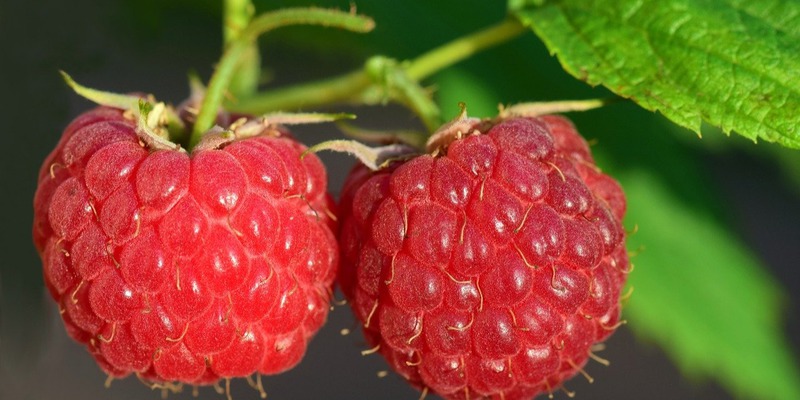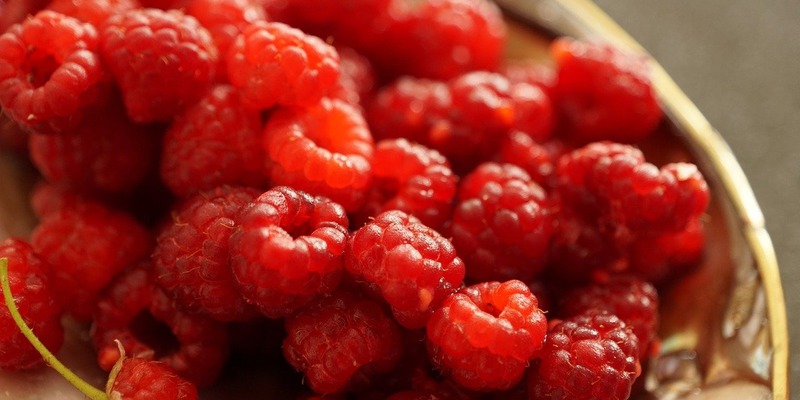Facts about the diet of raspberries

Wonderfully delicious, bright red raspberries are one of the most popular berries! They are a good source of health-promoting plant minerals and vitamins that are essential for optimal health.
Botanically, the raspberry is a small shrub that belongs to the Rosaceae family, the genus Rubus. It is native to Europe, but is now grown under farm supervision in many temperate regions of the world. Germany, Poland, the United States and Chile are some of the main raspberry growing areas.
There are several different subspecies of raspberry. However, the most common commercial variety in practice is the red raspberry, which is the result of a cross between the varieties R. idaeus (European raspberry) and R. strigosus (American raspberry).
Health benefits of raspberries are:
1. low calorie and low fat
Delicious raspberries are low in calories and fat. Nevertheless, they are a good source of fiber and antioxidants. 100 g of berries contain only 52 calories, but provide 6.5 g of fiber (16% of the recommended daily intake).
2. anti-inflammatory
Raspberries have significantly high levels of phenolic flavonoid phytochemicals such as anthocyanins, ellagic acid (tannin), quercetin, gallic acid, cyanidin, pelargonidin, catechins, kaempferol and salicylic acid. Scientific studies show that the antioxidant compounds in these berries play a potential role in curing cancer, aging, inflammation and neurodegenerative diseases.
3. regulation of blood sugar levels
Xylitol is a low-calorie sugar substitute derived from raspberries. One teaspoon of xylitol contains only 9.6 calories compared to 15 calories of sugar. Xylitol is absorbed more slowly into the blood in the intestines than simple sugar and does not contribute to a high glycemic index. It can therefore be helpful for people with diabetes to regulate large fluctuations in blood glucose levels.
4. defenses against infectious agents
Fresh raspberries are excellent sources of vitamin C, which is also a powerful natural antioxidant. 100 g of berries provide 26.2 mg or about 47% of the daily dose of vitamin C. Eating fruits rich in vitamin C helps the human body develop defenses against infectious agents, counteract inflammation and kill harmful free radicals.
5. against aging
Raspberry contains antioxidant vitamins such as vitamin A and vitamin E. In addition to the above antioxidants, it is also rich in several other health-promoting flavonoid polyphenolic antioxidants such as lutein, zeaxanthin, and ß-carotene, albeit in small amounts. Collectively, these compounds help act as protective scavengers against oxygen-derived free radicals and reactive oxygen species that play a role in aging and various disease processes.
6. high ORAC value
Raspberry has an ORAC value of about 4900 µmol TE per 100 grams, making it one of the highest ranking ORAC fruits.
7. red blood cell production
They contain a good amount of minerals such as potassium, manganese, copper, iron and magnesium. Potassium is an important component of cell and body fluids that helps control heart rate and blood pressure. Manganese is utilized by the body as a co-factor for the antioxidant enzyme superoxide dismutase. Copper is essential for the production of red blood cells.
8. metabolism
They are rich in the B-complex group of vitamins and vitamin K. Berries contain very good amounts of vitamin B-6, niacin, riboflavin and folic acid. These vitamins act as co-factors and help the body metabolize carbohydrates, protein and fats.
When are raspberries available?
Raspberries are available in markets year-round, but they are fresh and plentiful from June through October. Generally, raspberries are ready for harvest when they easily detach from the stem and turn a rich color (red, black, purple, or golden yellow, depending on the species and variety)-at the stage when they are ripe and at their sweetest.
What are good raspberries?

At the grocery store, select raspberries that are rich red, firm, plump, and free of sand and mold. Avoid raspberries that are dull, sunken or flattened, or have bruises and discolored spots.
Raspberries spoil early - they should be purchased only a few days before they are to be used. Just before storing them in the refrigerator, discard damaged or bruised raspberries so they don't spoil others. Place them in a wide bowl or spread out on a paper towel on a plate, then cover the entire plate with plastic wrap.
Raspberries will stay fresh in the refrigerator for a day or two. Use them as soon as possible unless otherwise frozen and stored in the freezer.
Preparation and serving methods
To wash the raspberries, immerse them in cold water in a large bowl for a few seconds and gently swirl them a few times to remove sand and insecticide residue. Gently pat them dry with a paper towel or cloth. This method helps to bring them back to normal room temperature, thus also increasing their aroma and enriching their flavor. Then remove the stems and caps, if any, by simply cutting them off with your fingers or a paring knife.
Here are some serving tips:
- Fresh raspberry pieces are a great addition to fruit or green salad.
- They can be a great snack between meals.
- Raspberries have also been used in fruit-based baked goods such as popular Danish pastries.
- Raspberries are a popular addition to dairy products, such as in strawberry flavored ice cream, milkshakes, smoothies and yogurt.
More information
Always consult your healthcare provider to ensure that the information displayed on this page applies to your personal circumstances.


















